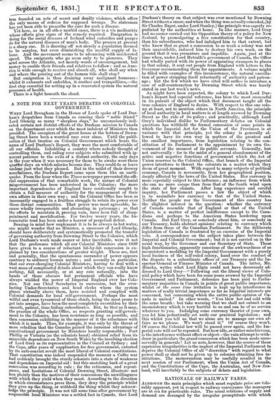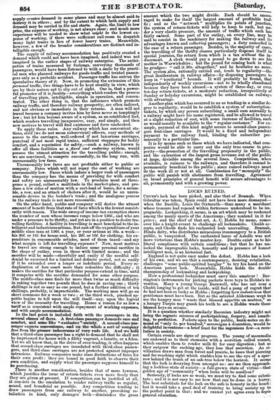RATIONALE OF RAILWAY FARES.
ALTHOUGH the main principles which must regulate price are tole- rably apparent, yet in respect to railway conveyance the managers are at sea for practicable rules. The usual relations of supply and d demand are deranged by the irregular promptitude with which supply creates demand in some places and may be almost said to destroy it in others ; and by the extent to which both supply and demand may be carried in fits and starts. Again, the limit to low price, the expense of working, is not always clear ; and much more experience will be needed to show what might be the lowest ex- pense of working, if there were sufficient rail-room to despatch many light trains in lieu of fewer heavy trains. Meanwhile, however, a few of the broader considerations are distinct and in- supply creates demand in some places and may be almost said to destroy it in others ; and by the extent to which both supply and demand may be carried in fits and starts. Again, the limit to low price, the expense of working, is not always clear ; and much more experience will be needed to show what might be the lowest ex- pense of working, if there were sufficient rail-room to despatch many light trains in lieu of fewer heavy trains. Meanwhile, however, a few of the broader considerations are distinct and in-
telligible enough.
The supply of railway accommodation has positively created a demand which could not have been imagined, and indeed was not imagined in the earlier stages of railway enterprise. The antici- pation of trains measured by furlongs, conveying thoneencle of passengers, would have been listened to with a smile by the practi- cal men who planned railways for goods-traffic and treated passen- gers only as a probable accident. Passenger-traffic has outrun the speculative theory of it. Now, in promoting the extension of this personal traffic, two things have to be kept steadily in view, which are by their nature apt to slip out of sight. One 19, that a power- ful promoter of it is facility--efierything which renders the process of travelling plain, intelligible, simple in operation, and concen- trated. The other thing is, that the influences which promote railway traffic, and therefore railway prosperity, are often indirect, and not obvious or immediate in their returns. A man will not travel because a company invites him by fares never so temptingly low ; but let him become aware of a system, as an established fact, which renders travelling inexpensive, easy, and simple, and then new motives to travel will find existence and force unchecked. To apply these rule& Any railway which has convenient sta- tions, civil (we do not mean subservient) officers, easy methods of access to the carriages, well-ordered if not luxurious carriages, punctual if not most rapid trains, sufficient stoppages for bodily comfort, and a reputation for safety,—such a railway, known to offer all those facilities as a iszed and enduring system, would possess the utmost attraction for the travelling public ; enough, we are convinced, to compete successfully, in the long run, with unreasonably low fares.
Unreasonably low fares are not profitable either to public or company. Fares which will not repay the coat of working are unreasonably low. Fares which induce a larger rush of passengers than the company has the means of providing for with comfort and safety are unreasonably low. To proclaim meat at three- pence a pound, collect a multitude in the market-place, and pro- duce a few sides of mutton with a cart-load of bones, for a scram- ble, a row, and an attack of cholera after it, would be an unrea- sonable device in the butcher's trade ; and the analogous process in the railway trade is not more reasonable.
On the other hand, public and company will derive the utmost amount of benefit from thatrate of fares which is the lowest consist- ently with reason. The wide sweep of income-tax exemption shows the number of men whose incomes range below 150/., and who are under a pressure to be thrifty, and yet are in a position to desire tra- velling facilities. A facility in travelling is most beneficial to the in- telligent and industriousartisan. But cast off the expenditure of your middle class man at 150/. a year, or your artisan at 30s. a week— his 301. or 16/. for house-rent, his 20/. or 101. for clothing, his ex- penditure in consumeable articles, most of them taxed—and say what margin is left for travelling expenses ? Now, most motives to travel are strong enough to induce some personal sacrifice in the shape of outlay, even in those with limited means ; and the sacrifice will be made—cheerfully and easily if the needful self- denial be exercised for a limited and definite period, not so easily if it be extended over a longer, or indefinite period. Every re- duplication of fare much more than redoubles the difficulty ; it makes the sacrifice for that particular purpose extend in time, until it competes with the sacrifice demanded for some other purpose. The middle-class man finds far more than twioe as much difficulty in raking together two pounds than he does in saving one ; thirty shillings is not so easy as one pound, but a further addition of tea ',killings, probably, is impracticable. The working man will go on short commons for a week or two • at the third week, pinched ap- petite begins to tell upon the will itself—nay, upon the logical view of the necessity for travelling. Hence a reason for as low a tariff as is consistent with ample repayment of working expenses, and with ample accommodation. In the last point is included faith with the passengers in the several classes of fares. A first-class passenger demands ease and comfort, and some like " exclusive " society. A second-class pas- senger expects convenience, and on the whole a sort of company free from the grosser indecorums of very rude life. And we hold that a third-class passenger has a right to demand that he shall not be imprisoned for hours with a filthy vagrant, a lunatic, or a felon. Yet we all know that, in the drive of over-trading, it often happens that second-class carriages are inundated with third-class passen- gers, and third-class carriages are not protected against improper intrusions. Railway companies make class distinctions of fares for their own profit : they are bound in good faith to observe their own condition, and supply what the passenger supposes himself to
purohasing.
There is another consideration besides that of mere lowness, which justifies the issue of return-tickets even more freely than they are given at present. If competition can be justified at all, it cozisists in the emulation to render railway traffic as regular, mound, and beneficial as possible. Any competition tending to draw passengers from one railway to another provoking re- taliation in kind, only damages both—diminishes the gross amount which the two might divide. Each should be encou- raged to make for itself the largest amount of profitable tree.. fib; and as the " network " multiplies its pinta of junction, the system of return-tickets will help to keep to each, but un- der a very elastic pressure, the amount of traffic which each has fairly earned. Some part of the outlay, on every line, may be said to consist in the machinery for meking the railway and its advantages known and collecting passengers ; a duty unneeded in the case of a return passenger. Besides, in the majority of cases, the travelling of the thrifty classes particularly disposes itself in special journies, the return from which is a tax without the in- ducement. A clerk would pay a pound to go down to see his mother in Warwickshire ; but the pound for coming back is what he grudges : "call it 30s. altogether, and he hesitates no more. The system also, rationally carried out, tends to regularity—the great desideratum in railway affairs—by disposing passengers to keep in "territorial" bounds. It will probably be found, that independently of weekly excursions—not to be wholly abandoned because they have been abused—a system of three-day, or even ten-day return-tickets, at a moderate reduction, irrespectively of Sunday or holyday excursions, might be established on railways with advantage.
Another plan which has occurred to us as tending in a similar de- gree to regularity, would be to establish a system of subscription- tickets, by which any person subscribing a small sum annually to a railway might have his name registered, and be allowed to travel at a slight reduction of cost, with some increase of facilities, such as would usually be available to the "regular customer." For ex- ample, payment of this kind might secure to second-class passen- gers first-class carriages. It would be a fixed and independent payment to the railway fund, binding the subscriber per- manently to a particular line. It is by means such as those which we have indicated, that com- panies would be able to carry out the only true course to pros- perity—the promotion ef the travelling propensity in the public, and the extraction of the largest gross revenue out of the public at large, divisible among the several lines. Competition, when available, is ruinous to the railways, and therefore it cannot be permanently beneficial to the public since ruined railways must do the work ill or not at all. Combination for "monopoly" the public will punish with abstinence from travelling. Agreement on broad principles of general benefit will secure advantages to all, permanently and with a growing power.



























 Previous page
Previous page